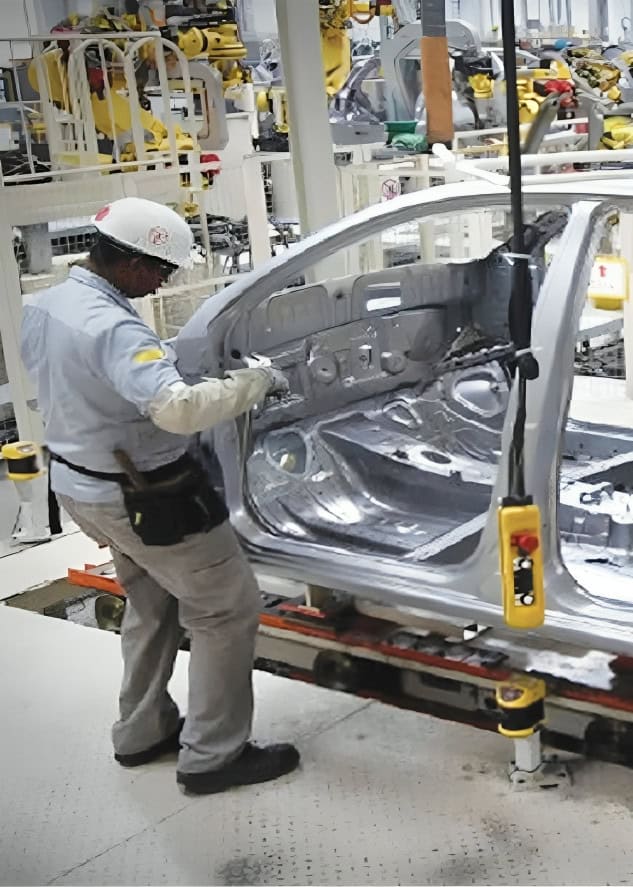BYD Brazil scandal exposes flaws in Chinese investment
“Slavery-like” working conditions have been uncovered at the Chinese EV maker’s factory site in Brazil, casting a spotlight on the standards maintained by Chinese companies outsourcing workers at foreign locations.
The thermometer read over 30 degrees Celsius (around 90 Fahrenheit) in the early hours of December 23, when Brazilian authorities turned up at the construction site of car giant BYD’s new factory in Camacari, in the northern state of Bahia.
MPT investigators told DW that they rescued 163 Chinese workers from “slavery-like” working conditions at the site.
In the dormitories of the Jinjiang Group, the company hired by BYD to carry out the work, there were no mattresses on the beds, and the few toilets served hundreds of workers in extremely unhygienic conditions. The workers also had food stored without refrigeration.
The Brazilian Labor Prosecutor’s Office (MTP) also accused the companies of withholding the workers’ passports and keeping 60% of their wages; the remaining 40% would be paid in Chinese currency.
After authorities claimed that the workers were victims of international human trafficking, the site was shut down. The factory had been due to open in 2025.
The 163 rescued workers were sent to hotels. A few days later, the Brazilian government stopped issuing temporary work visas to BYD. The carmaker said it was cooperating with the Brazilian authorities and that it would not tolerate disrespect for Brazilian law and human dignity.
Experts told DW that the case pits the importance of Chinese investment against upholding local standards.
China’s overseas production in focus
In January, MPT investigators met with representatives of BYD and the companies involved in the construction.
All of the rescued workers have already received their termination payments and returned to China. A report on the inspection of the site will be completed next week, and compensation for the workers will be discussed at a subsequent meeting.
Brazilian investigators also shut down a Chinese-run construction site after finding poor working conditions.
Using Chinese workers to build the BYD plant is similar to how Chinese multinationals operate in Africa and other Latin American countries, said Paulo Feldmann, an economist and professor at the FIA Business School in Sao Paulo.
The practice brings little benefit to the countries that receive the investment, he told DW.
“For Brazil, it would have been better if these workers had been local, because of the income they would have generated for themselves and their families, the positive impact on their communities and the professional training they would have acquired. It would also be easier to monitor their working conditions,” he said.
Brazil launches reindustrialization project
Camacari, a city of 300,000 near the state capital of Salvador da Bahia, was previously home to a Ford car factory for 20 years. But the plant was shut down in 2021, and the US carmaker ceased production in Brazil.
The shutdown came along with a slump in Brazilian industrial production, which in 2021 accounted for only 11% of GDP.
When Luiz Inacio Lula da Silva was elected president in 2022 with the promise of reindustrializing Brazil, his administration sought out partner companies interested in setting up shop.
In 2023, Chinese electric carmaker BYD announced a $484 million investment in a new factory to produce its electric vehicles on part of the grounds that once belonged to Ford.
BYD’s arrival also brought hope to the local economy
“These are huge investments that show that the brand has arrived to fight in a structured way in the Brazilian automotive market. They’re not the adventurers we sometimes see,” Milad Kalume Neto, an automotive consultant, told DW.
China alleges smear campaign
Public reaction in China to the BYD case has been divided between skepticism about foreign allegations and debate about labor rights in the country.
In the aftermath of the scandal, BYD and its contractor, Jinjiang Group, have denied the allegations. They called them part of a smear campaign against Chinese brands, a narrative supported by many Chinese nationalists.
“When someone wants to accuse you, there’s no shortage of excuses,” Li Yunfei, general manager of BYD Group’s brand and public relations department, posted on Weibo, a popular microblogging platform in China.
But not everyone in China has accepted the idea of blaming “foreign forces.”
Some Weibo users wrote that working conditions at [the] BYD factory in Brazil were similar to those of construction workers in China. This sparked online discussions about how many workers in China could be living in conditions that are slavery-like by international standards.
Edited by: Wesley Rahn https://www.dw.com/en/byd-brazil-scandal-exposes-flaws-in-chinese-investment/a-71249057

